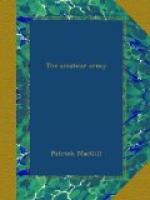Even as we lay, and while the officers were explaining the work in hand, the artillery took up its stand on several wooded knolls that rose behind us. What a splendid sight, the artillery going into action! Heavy guns, an endless line of them, swept over the greensward and rattled into place. Six horses strained at each gun, which was accompanied by two ammunition wagons with six horses to each wagon. How many horses! How many guns! Out of nowhere in particular they came, and disappeared as if behind a curtain barely four hundred yards away. Thirty minutes afterwards I fancied as I looked in their direction that I could see black, ominous muzzles peering through the undergrowth. Probably I was mistaken. Anyhow, they were there, guarding us while we slept, our silent watchers!
About eleven o’clock an orderly stole in and spoke to the colonel, a hurried consultation in which all the officers took part was held, and the messenger departed. Again followed an interval of silence, only broken by the officers creeping round and giving us further information. The enemy was repulsed, they told us, and was now in retreat, but before moving off he had blown up all the bridges on the river. The artillery of our main army in front was shelling the fleeing foe, and our engineers had just set off to build three pontoon bridges, so that the now sleeping division could cross at dawn and follow the army in retreat.
Our dawn came at one o’clock in the afternoon; a whistle was blown somewhere near at hand, and the battalion sprang to life; every unit, with pack on back, cartridge pouches full, rifle at the order, was afoot and ready. Only two hours before had the engineers set out to build the bridges which the whole division, with its regiment after regiment, with its artillery, its guns, ammunition wagons and horses, its transport section, and vehicles of all descriptions, was now to cross. The landscape had changed utterly, the country was alive, and had found voice; the horse-lines were broken, and all the animals, from the colonel’s charger to the humble pack horse, were on the move. The little squares, dotted brown, had taken on new shape, and were transformed into companies of moving men in khaki. We were out on the heels of the retreating foe.
Two hours’ forced marching brought us to the river, a real one, with three pontoon bridges, newly built and held firm on flat-bottomed boats moored in mid-stream. We took our way across, and bent to the hill on the other side. Half-way up, in a narrow lane, a wagon got stuck in the front of our battalion, and we were forced to come to a halt for a moment. Looking back, I could see immediately behind three lines of men straining to the hill; farther back the same lines were crossing the bridges and, away in the far distance, pencilled brown on the ploughed fields, the three lines of khaki crawled along like long threads endlessly unwinding from some invisible ball. Now and again I could see the artillery coming into sight, only to disappear again over a wooded knoll or into an almost invisible hollow.




